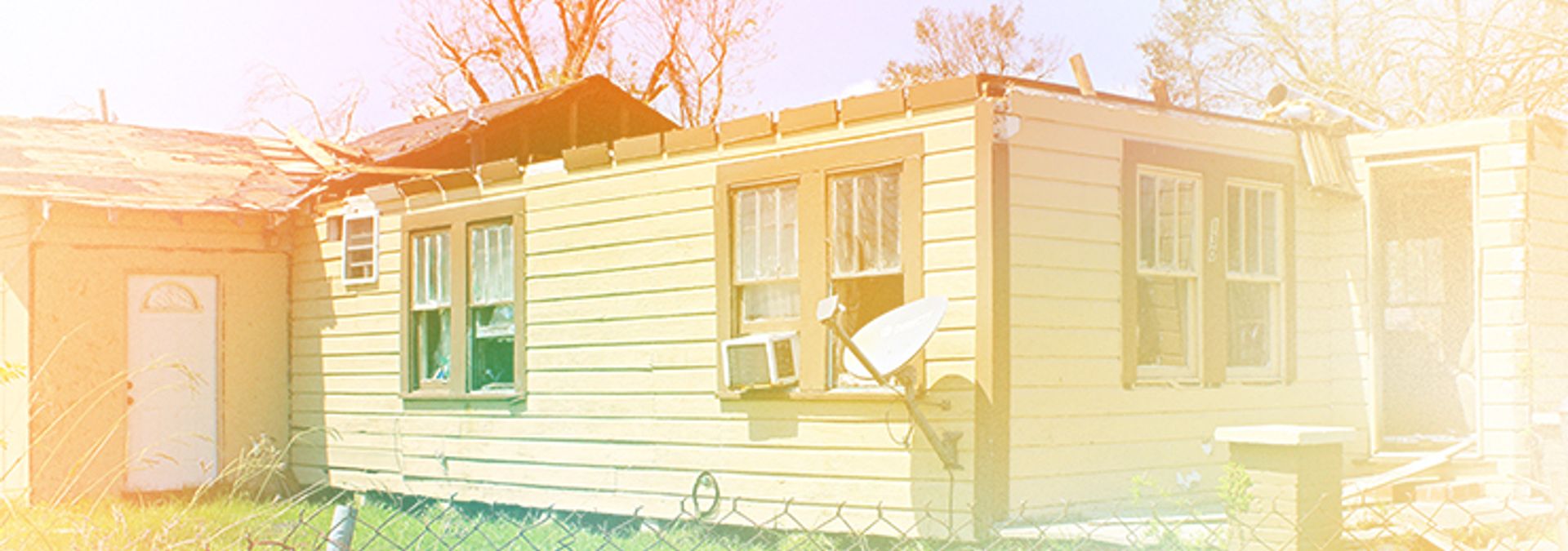
Louisiana has been battered this hurricane season. Will the attention last as long as the recovery takes?
Hurricane Laura ripped the roof of this home in Lake Charles. Photo: 2C2K Photography, modified under CC BY 2.0.
This story was co-published with Scalawag, a journalism and storytelling organization that illuminates dissent, unsettles dominant narratives, pursues justice and liberation and stands in solidarity with marginalized people and communities in the South.
The Gibson family lost nearly everything when Hurricane Laura struck Lake Charles. All of it — their mobile home, the mobile home they owned and rented next door, and all the necessary pieces in between that helped their lives function smoothly.
As LaShonda Gibson unloaded bags of paper towels and toilet paper from the back of an SUV in her mother-in-law’s driveway in nearby Moss Bluff, where she and her family were staying two days after Laura struck, she had only just begun accounting for the long and frustrating rebuilding process lying ahead. They were just getting back to town. Ahead of the storm, they had evacuated more than a hundred miles away to East Texas.
“We’re just trying to make it for right now,” she told me. “I mean, it’s hard. You have COVID-19. I have elderly people with me. I’m sick — I had a medical procedure on Monday before [the storm] happened. It’s just been rough.”
Gibson is worried her husband will be out of work for the time being, too. The company in town where he is a crane operator had its roof blown off during the storm, and it was unclear when the building would be operational again. He could only shake his head.
“It’s just a complete loss,” he said. (He declined to share his name with me.)
LaShonda hopes that he can get on a disaster cleanup crew in the coming weeks. “His mom has no money, nothing, so we’re having to take care of her, my mom, my son, and us, on one check. He’s not working, so he’s not going to get paid. That’s just the money we’ve had saved,” Gibson says.
She sighs and shakes her head at everything they lost. “When you can stand outside your house and look inside it, it’s just horrible.”
In the ensuing days after Laura hit the region, Lake Charles Mayor Nic Hunter said between 4,000 people to 5,000 people from Calcasieu Parish had been displaced. Like them, the Gibson family is not sure what comes next. Their story reveals the human element of the climate crisis, and it reveals an uncomfortable truth: those least responsible for the climate-changing pollution increasing the severity of storms are impacted the most.
This summer has seen one of the busiest hurricane seasons on record, with at least 27 named storms so far. Laura was among the season’s most powerful. On August 27, it hit southwest Louisiana with more than 150-mph winds, triggering a diaspora of evacuees. Six weeks later, Hurricane Delta devastated the region, again, when it made landfall as a Category 2 storm. Many evacuees have since returned. Even so, some say the nation’s attention has moved on, as their homes remain in ruins. They worry it’ll be up to them alone to pick up the pieces. In many ways, it seems, it is.
Since Laura hit, Lake Charles resident Kelli Stawecki says she hasn’t been able to see the road from the windows in the front of her home due to the debris piled high in the street.
Her home isn’t habitable at the moment, anyway. Laura damaged the roof, which they promptly tarped — but then Delta ripped it off, and without electricity to circulate air while the power grid is down, she suspects mold is growing.
Stawecki’s options for alternative housing are limited. Nearby motels and hotels were damaged, too, forcing closures. The nearest places to rent, she says, are all the way in Baton Rouge or Houston. The commute alone would be expensive. “It’s like living in a town where a bomb went off and the whole city is destroyed, and you don’t see a way out,” Stawecki says, her voice a decrescendo. “I don’t want to be pessimistic. I want to be hopeful. But you can’t see it. There’s so much to be done.”
READ MORE ABOUT THE IMPACT OF HURRICANE LAURA: The communities who need it most aren't receiving air quality information during disasters
Limbs and shreds of trees still litter the roadways. Stores to buy groceries are hard to come by, if operational at all. Of the few fast, easy food options there are, the hours to go out and purchase a meal are limited, as are the options on menus. Often, Stawecki says, they’re forced with a decision to find a meal or work on their house each day.
“It’s really, really heart-wrenching,” Stawecki continues. “I am not a depressed kind of person. I serve in the ministry. I run a homeless outreach through our church and a food pantry. Not a whole lot of situational things will make me depressed, but this is the worst that I’ve ever felt in my whole life, even after the death of my dad. Every curb is filled six-feet-high worth of people’s houses.”
Stawecki thinks most people have become desensitized to natural disasters like Laura and Delta. She thinks the nation at large has become numb to the people who experience it. But that only underscores the inequity across the country that some communities face, whether they’re rebuilding in Lake Charles or breathing industrial pollution in Port Arthur and Houston. A new survey conducted with WE ACT for Environmental Justice and Environmental Defense Fund shows that a vast majority of Black and Latino residents in Houston understand how they are being impacted and threatened already by the climate crisis — an awareness shared much less readily by their white neighbors. Only 36 percent of white Houstonians said they had heard of the idea of “environmental justice.”
Residents across threatened communities say they’re waiting for public perception to catch up with their lived experiences. They understand it would be the first step in addressing the climate crisis in a just way, but it’s unclear how it might happen. Stawecki, for example, recently called her bank to ask how to deposit a check. Much to her surprise, her bankers hadn’t even heard about the storm.
The same could be said for friends and family living elsewhere across the country. At first, the calls and texts checking up on her and her family were frequent. Then, within days, they stopped.
She doesn’t blame them. Stawecki’s not sure who — or what — to blame. “Honestly, I don't know if there was more plastered on national news or something, more people would be willing to help … because we need help,” she says. “We desperately need help.”
Xander Peters is freelance writer living in New Orleans. His work has appeared in Scalawag, Rolling Stone, Reason, and the Texas Observer. You can find him on Twitter @hipxander.
STAY UP TO DATE
The quality of our newsletter is considered satisfactory and poses little or no risk.
SUBSCRIBE

